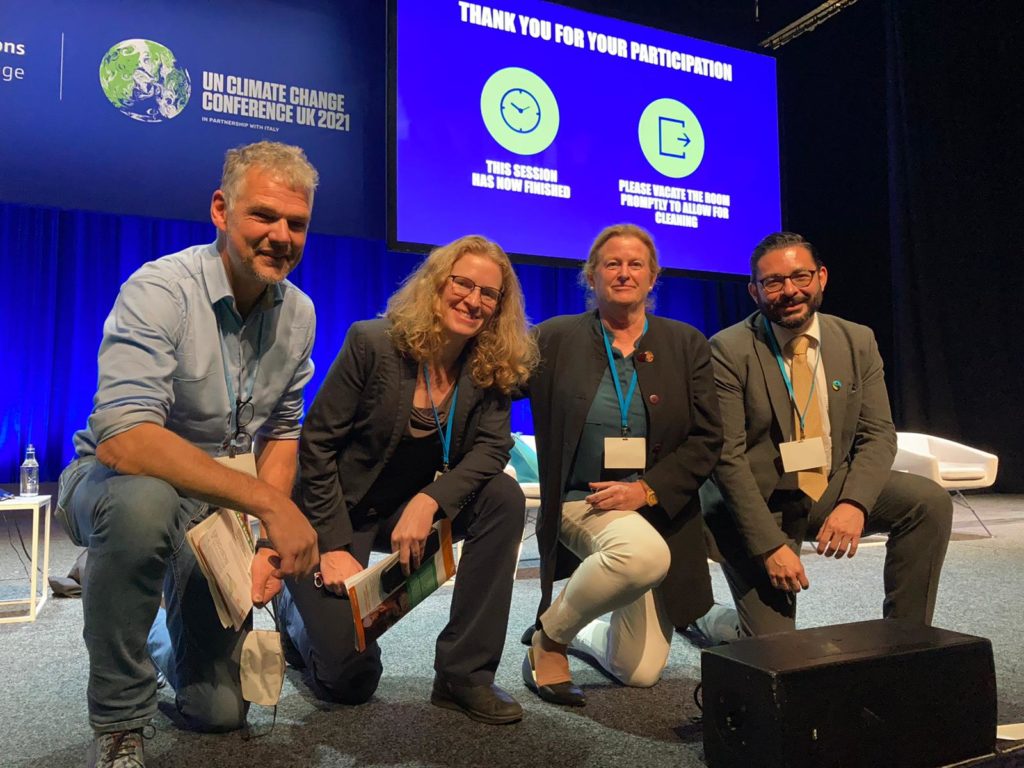The world was watching Glasgow, hoping for decisive decisions and actions to counter climate change. Was COP26, this year’s UN Climate Change Conference, a success or a failure? Linda Lap from the FairClimateFund, a Cordaid subsidiary, took stock and reports.

Back in the Netherlands from Glasgow, I took stock and came to realize the true importance of the outcomes of the 26th UN Climate Change Conference (COP26). It is considered one of the most important diplomatic meetings in history. Our future is at stake.
The recent report released by the Intergovernmental Panel on Climate Change (IPCC) in August 2021, provides new estimates of the probability of exceeding 1.5°C in the next decades. It states that, unless there are immediate, rapid, and large-scale reductions in greenhouse gas emissions, limiting global warming to 1.5°C or even 2°C will be beyond reach.
Unfair
Climate change affects us all, but people in developing countries are much more vulnerable to its consequences. It is incredibly unfair that they suffer more than us, in the West, while we are largely responsible for climate change. That is why Cordaid and subsidiary company FairClimateFund have adamantly campaigned for fair climate finance and a fair zero-carbon economy during COP26.
“No more time for ‘blah, blah, blah’. We need action now to avert the worst and safeguard our future. And to achieve climate justice.”
Fair climate finance means that rich countries financially contribute to countries in the Global South who are most affected by climate change to support mitigation and adaptation. This finance should become more easily available and also, more funding should go to programmes in climate change adaptation and loss and damage which is about the destruction already taking place in developing countries by the climate crisis.
Rich countries refuse to take drastic action
However, rich countries have so far not delivered on their promise to make $100 billion a year available to countries in the Global South to help them meet their climate goals and deal with the negative impacts of climate change. Also, the call for rich countries to double their efforts at the beginning of COP26 has not been met. Needless to say, many developing countries are highly disappointed. Greta Thunberg went so far as to say that COP26 has been a failure.
“The COP has turned into a PR event, where leaders are giving beautiful speeches and announcing fancy commitments and targets, while behind the curtains governments of the Global North countries are still refusing to take any drastic climate action”, says Thunberg.
“Often, carbon finance does not reach small-scale farmers or low-income households at the bottom of the pyramid, while they are actually vital to the emission reductions.”
Now that we have concluded that the pledges made at COP26 are not sufficient, another big question is whether pledges that have been made lead to action? For example, executive vice-president of the European Commission Frans Timmermans said that developed countries have to scale up international climate finance. Therefore, the European Commission committed an additional €100 million from the EU budget to the Adaptation Fund to support developing countries. Let’s hope that they will put their money where their mouth is. And that others will follow.
A Fair Race to Net-Zero
FairClimateFund also campaigned for a ‘Fair Race to Net-Zero’. We spoke about this topic during events in the Germany and Colombia Pavilion and during a side-event in the so-called Blue Zone of COP26. The Blue Zone is where the key negotiations between world leaders take place. A ‘Fair Race to Net-Zero’ aims to ensure that a transition to a net-zero carbon economy is fair, inclusive, and gender-focused and doesn’t overlook people living in the most vulnerable regions.

Carbon markets are instrumental to getting the necessary carbon finance from the private sector to support mitigation and adaptation activities in countries in the global south.
However, people at the base of the value chain benefit the least. Often, carbon finance does not reach small-scale farmers or low-income households at the bottom of the pyramid, while they are actually vital to the emission reductions.
The pressure of large corporates to supply low-priced carbon credits results in a limited share of carbon income for the ones with the least bargaining power. Since the Paris Agreement, two initiatives have been created that led to more fairness and inclusiveness in the voluntary carbon market. One is the Fairtrade Climate Standard and the other one is the W+ Standard that focuses on the empowerment of women and channels funds directly to women.
We need action now to avert the worst
Reflecting on COP26, I feel the same disappointment as Greta and so many others. But there were a few successes. First of all, the campaign for fair climate finance and a fair zero-carbon economy gained a lot of attention during COP26 which is good. However, there is still a lot to be gained, so we will continue our efforts to keep the conversation going in the Netherlands and abroad.
Furthermore, there were some successes at COP26 with pledges to halt deforestation and cut methane emissions. The pledge to phase down coal and fossil fuels was a modest step in the right direction. Of course we had hoped leaders of rich – and polluting – countries would have taken a bolder decision to phase out coal altogether.
Now, the clue lies in the follow-up and implementation. Something we, and the rest of the world, will monitor closely. No more time for ‘blah, blah, blah’. We need action now to avert the worst and safeguard our future. And to achieve climate justice.
Linda Lap, Manager Marketing & Communications FairClimateFund